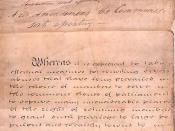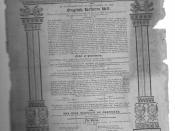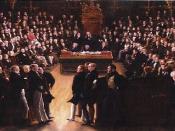3 |
Without external parliamentary pressure the reForm act of 1832 would never have been passed. To what extent do you agree with this view?
It could be said that the Great Reform Act was a piece of legislation that was wholly expected; after all, the age of the Tudors had seen the destruction of the medieval privileges of Church and Baronage, and so it was the natural scheme of events that reform would inevitably arise and modify the constitution. So the question to be dissected here is not 'whether', but 'why' - why was the Reform Act passed in 1832? Was it due to a modification of the type or intensity of external parliamentary events compared to before? Either way, whether it was 'great' as was claimed, or a "Compromise stitched together" (Evans), the Reform Act was the product of substantial popular demand and critical parliamentary events. It shall be evaluated here that pressing agitation for reform coincided with Whig ascension to power and the collapse of the Tories, thus inspiring the rigour and vigour of calls for reform.
The institutions being scrutinized for reform (parliament & the cabinet) were administered by a privileged group of borough owners, magistrates and members of close corporations in sympathy with the 'country gentlemen'. Protesting against the rotten boroughs and close corporations was "to utter seditious words against [our] matchless constitution", but since the industrial revolution, a fresh creative process emerged to adapt to the needs of the new type of society (an empowered economically powerful middle class) that would agitate for reform to synchronise parliament to its needs and desires. G.M Trevelyan predicted that "this new type of society was by its nature predestined to undergo perpetual change" - and so the flaw in the argument becomes apparent - "would never have been passed" is essentially misleading, as the focus of the question asks us for the significance of the date 1832.
It could be stated that external parliamentary pressure stemmed from the direct inspiration of middle class opinion and under compelling fear of working class revolt (the French Revolution was still fresh in people's memories and the 1830 Bourbon Revolution a recent reality). The movement for parliamentary reform, it could be argued, was revived first of all by working men, seeing as their economic misery was most acute. Discontent helped create a very palpable atmosphere of uncertainty and fear, which intensified the pressure for reform. Luddite revolts as early as 1812 demonstrated how the political system was largely ignorant of the plight of the lower classes, plunged in an economic and social cesspit by the onset of mechanisation; the Spafield Riots of 1816 led by Henry Hunt saw the active popular demand for parliamentary reform, to create a more just society; The 'March of the Blanketeers' & subsequent 'Derbyshire Insurrection' screamed out the pressing need for representation of the poor and unemployed, so that their lives could be improved, let alone recognised. The culmination of these series of agitations for reform was the St Peters Field unrest in 1819, infamously labeled the 'Peterloo Massacre'. The reaction to reform by the conservative magistrates was clear to see. The yeomanry charged, killing 11 and injuring hundreds. The intensity, variety and sheer number of incidences, revolving around discontent with the parliamentary system, put a strain on those in parliament and must have frightened them to a certain extent to make concessions. Agitation in the case of Catholic Emancipation being a perfect example of this.
The campaigning of radicals, such as Thomas Attwood, was another extra-parliamentary source of pressure. The founding of the Birmingham Political Union 1830 collated the voices of thousands calling for parliamentary reform, and for the first time, united the middle and working classes. William Cobbett the great radical agitator found his base of support from 1817 augmented dramatically, and in 1830 even farmers thronged to hear his speeches. Reform associations erupted in all regions of the country, followed by riots (Merthyr Tydfil, Bristol, Nottingham), and revolutionary slogans, like "The bill, the whole bill, and nothing but the bill" & "No taxation without representation" (T Paine), infiltrated the ears of the mob. Indeed radicalism had become almost a national creed - E.P Thompson became convinced that "Britain came within an ace of revolution", and that the unrest and popular demand of reform was the primary cause of the Reform Act, regardless of the goings-on of Parliament.
Moreover, the 'Days of May' haunted the elite and sparked up apprehensive thoughts of the 'Glorious Days of July' of the Bourbon Revolution in France, and stressed the threat of downfall if the constitution was misused. The British middle class saw the bourgeoisie governing France, and blushed that in England they themselves were subjects of aristocracy. The working classes heard that the ouvriers had defeated the army, and word went round that what the Frenchmen did, the Englishmen could do at need. The Belgian Revolution in conjunction with the French in 1830 precipitated the fear of status-quo upheaval for the parliamentary elite to see, and yet again, the precarious position of the landed governors of the country was lit up in a lightning storm of radicalism, righteousness and reform.
In order to appreciate the intrinsic importance of external parliamentary pressure, it is necessary to look at perceptions to reform within parliament. There was a general consensus that any type of reform would damage the supremacy of the land-owning aristocracy, who were believed to have the best interest of the country at heart -a notion reflected in Lord Grey's statement that "Class is a guarantee for the surety of the State". Wellington and the Tories argued that the Old System functioned well, and produced political geniuses like Pitt, Burke, Fox and Huskisson, who led the country through dangerous periods of the French Wars to a period of industrial and commercial greatness, and therefore needed no change. Indeed, Peel commented that "I have no intention in opening a door I saw no prospect of being able to close" - accurately describing the stance of a majority of those in parliament, and showing that pressure from the outside of parliament was needed to catalyse change.
It is therefore hard to imagine the Reform Act being passed on its own accord - a case study being Catholic Emancipation of 1929, which required agitation prior to its success - as it was these pressures that called the need for reform and were crucial in mauling the notion straight over the Parliamentary try line in 1832.
Although agitation for reform outside the confines of parliament was undoubtedly critical, more important was its coincidence (or rather, accumulation to the point of) the Whig ascension and the fracturing of the Tory hegemony. The death of Liverpool and the unpopularity of Wellington split the Tories into various sects of radicals and ultras, and exposed a chink in the armour which the Whigs could exploit. The threat of the creation of 50 Whig "Johnny-come-lately" peers to force through the Reform Bill was crucial in securing its passage.
The reelection of the Whigs was a parliamentary occurrence that helped pave the way for reform, as Grey led a 130 majority that was more well-disposed to reform than the Tories previously holding office. "Reform so we may preserve" was seen as a compromise that justified the reform act and facilitated its passage through the Lords and Commons. The elite's attempt to satisfy the agitators for reform via a compromise bill that would preserve their status quo was described by Karl Marx as "Tricks, juggles and frauds", but no matter how it was labeled, without it, the Reform Act would have probably never been passed!
To conclude, it can be said that the reform bill could have potentially been passed with limited external parliamentary pressure, had the condition that the Whigs, who were more favorable to reform were in power, been satisfied, seeing as the Catholic Emancipation Act of 1929 had already provided a platform for acclimatisation for reform in Parliament. However, the need for Reform, had it not been voiced by the masses, would have allowed the elites to remain passive and oblivious, as it would have not directly threatened their existence and position. It is only when the voice of discontent became politicised that the elites deemed it necessary to take notice - as the fear of revolution became a palpable reality.
Biography:
Parliamentary Reform, c. 1770 - 1918 - Eric J Evans
Success in British History 1760 - 1914 - Peter Lane
Government and Reform 1815 - 1918, Robert Pearce and Roger Stearn




